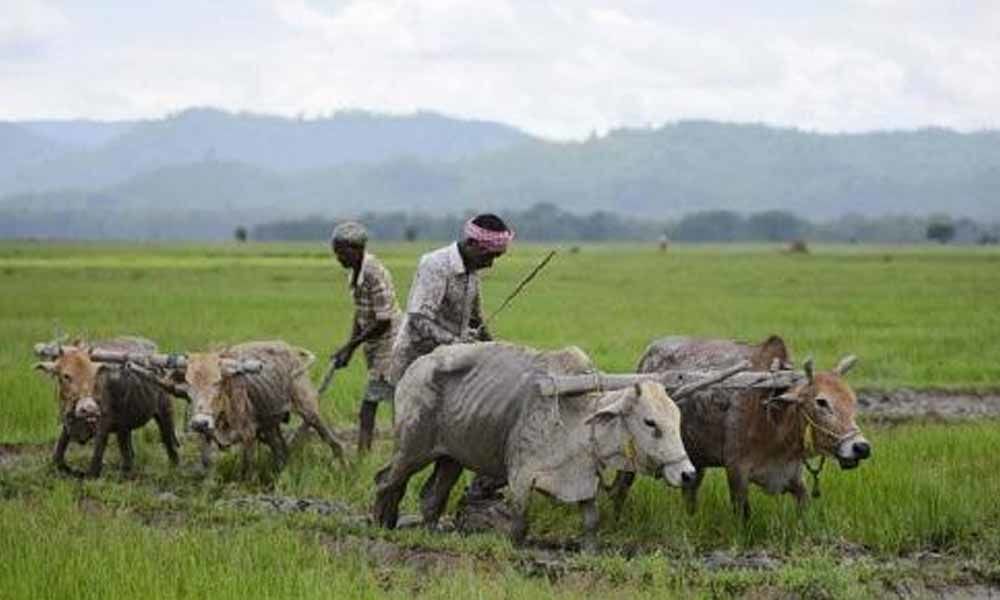Live
- Gentle in manner, resolute in convictions: Sonia Gandhi pens emotional note for Dr. Manmohan Singh
- 2024: A landmark year for India's defence achievements and breakthroughs
- 2025 Horoscopes: Insights and Guidance by Pt. Umesh Chandra Pant
- Osamu Suzuki was a legendary figure in global auto industry: PM Modi
- “AMOEBA”: Celebrating the Journey of Telugu Entrepreneur Sri Motaparti Siva Rama Vara Prasad
- Sachin Khedekar recites a poem from director Feroz Abbas Khan’s powerful new play, ‘Hind 1957’
- NABL-QCI appoints Dr. Sandip Shah as chairperson
- Centre transfers Rs 2.23 lakh crore for 1,206 schemes under Direct Benefit Transfer
- BGT 2024-25: Watching Konstas bat reminds me of Symonds, says Hayden
- 75 iconic lighthouses in India saw more than 10 lakh visitors till September
Just In
Economic Survey calls for new policies to improve water efficiency in farm sector


Expressing concern that India will be in the global hot spot for 'water insecurity' by 2050, it said the focus in agriculture should shift from 'land productivity' to 'irrigation water productivity'.
NEW DELHI: India's Met Department has projected less rains in some region which could affect the crop production in those areas, the Economic Survey said, and called for framing new policies to improve water use efficiency in the agriculture sector.
Expressing concern that India will be in the global hot spot for 'water insecurity' by 2050, it said the focus in agriculture should shift from 'land productivity' to 'irrigation water productivity'.
"Therefore, devising policies to incentivise farmers to adopt efficient ways of water use should become a national priority to avert the looming water crisis," the survey added.
The Indian Meteorological Department (IMD) has predicted near-normal southwest monsoon this year.
However, there was 33 per cent deficient in rainfall during June that led to less coverage of kharif crops.
IMD has also said that rains in July and August would be good.
"IMD has predicted the rainfall over the country as a whole is likely to be near normal this year. This should lead to an improvement in agriculture sector growth."
"However, according to IMD, some regions are expected to receive less than normal rains. This could prove to be detrimental for crop production in certain affected areas," the survey said.
Noting that the country's agriculture is highly dependent on water, the Economic Survey said there is a major concern whether the present practice of groundwater use can be sustained as the depth of the groundwater level continues to drop.
Around 89 per cent of groundwater extracted is used for irrigation and crops such as paddy, and sugarcane consumes more than 60 per cent of irrigation water, it said.
"Focus should shift from land productivity to 'irrigation water productivity'. Therefore devising policies to incentivise farmers to improve water use should become a national priority," it suggested.
The thrust should be on micro-irrigation (MI) that can improve water use efficiency, the survey said, suggesting the government to replace subsidies to MI supporting cropping pattern in view of the high cost of installation.
A combination of measures, which suit the local agro-economic context, need to be applied to improve irrigation productivity in agriculture that will reflect sustainable water use in agriculture, it said.
Observing that fertilizer response ratio has been declining over time, the survey said organic and natural farming techniques, including Zero Budget Natural Farming (ZBNF), can improve both water use efficiency and soil fertility.
Adopting appropriate technologies through Custom Hiring Centers and implementation of Information and Communication Technologies (ICT) are critical to improve resource use efficiency among small and marginal farmers, it said.
That apart, diversification of livelihoods is critical for inclusive and sustainable development in agriculture and allied sectors.
Policies should focus on dairying, livestock rearing particularly of small ruminants and fisheries sector, it added.
Stating that farmer sector growth witnessed tapering in 2018-19, the survey said the share of the farm sector in total Gross Value Added (GVA) has been consistently falling and now stands at 16.1 per cent in the last fiscal.
The agriculture sector had investment rate much less than half of that of services and industry sectors.
As per the third Advance Estimates released by the agriculture ministry, the total production of foodgrains during 2018-19 is estimated at 283.4 million tonnes, as compared to 285 million tonnes in 2017-18 crop year (July-June).

© 2024 Hyderabad Media House Limited/The Hans India. All rights reserved. Powered by hocalwire.com






